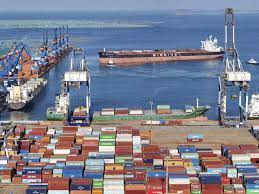China’s July Exports Experience Double-Digit Plunge, Adding Pressure to Bolster Ailing Economy

China’s July Exports Experience Double-Digit Plunge, Adding Pressure to Bolster Ailing Economy: China, facing a significant economic challenge, saw its exports plummet by double digits in July, raising concerns for the Communist Party to steer the nation’s economy out of its current slump. The decline which includes a 14.5% drop in exports compared to the previous year, emphasises the need for governmental measures to stimulate economic growth.
Daily Current Affairs Quiz: August 2023
Export Downturn Deepens
In a stark demonstration of the economic challenges, China’s exports witnessed a steep decline, totaling $281.8 billion for July. This drop was even more pronounced than the 12.4% contraction recorded in June, as per recent customs data. This trend is indicative of the weakening global demand for Chinese goods.
Weak Domestic Demand Reflected in Imports
Similarly, the import sector followed this downturn, with imports falling 12.4% year on year to $201.2 billion. This points to subdued domestic demand within China, and the contraction widened from the 6.8% reduction observed in the prior month.
Trade Surplus Narrows
The country’s trade surplus, which had reached record heights a year earlier, narrowed by 20.4% to $80.6 billion. This shift further underscores the strain on China’s export-oriented economy and highlights the need for remedial actions to restore balance.
Economic Contraction and Struggle for Growth
The economic repercussions of these declining exports are evident in China’s growth trajectory. In the second quarter, economic growth decelerated to a mere 0.8%, a significant drop from the 2.2% recorded in the previous quarter. This translates to an annual growth rate of approximately 3.2%, marking one of China’s weakest performances in decades.
Leaders’ Efforts to Revive the Economy
Chinese policymakers are actively looking for ways to rejuvenate both consumer and business activities. While the nation experienced a post-pandemic rebound after the easing of anti-virus measures, this recovery fizzled out sooner than anticipated.
Challenges in Policy Approach
Despite promises to support entrepreneurs, incentivize consumer spending, and bolster the housing market, the ruling Communist Party has yet to unveil substantial stimulus packages or tax cuts. This has raised concerns about the effectiveness of China’s current policy measures in tackling the economic downturn.
Global Factors Influencing Demand
The cooling demand for Chinese exports can be partially attributed to actions taken by the Federal Reserve and other central banks across Europe and Asia. These institutions raised interest rates to combat surging inflation, impacting China’s export performance.
Magnitude of Export Contraction
The 14.5% decline in exports marks the most significant contraction since the onset of the COVID-19 pandemic in 2020. However, this decline is largely attributed to falling prices, as the volume of goods remains higher than the levels observed before the pandemic.
Future Outlook and Geopolitical Implications
Capital Economics analysts believe that exports will continue to fall in the following months, with a possible rebound towards the end of the year. Nonetheless, the short-term prospects for consumer spending in developed economies remain challenging.
Global Trade Dynamics
China’s exports to the United States registered a substantial 23% decrease, amounting to $42.3 billion. Simultaneously, imports of American goods receded by 11.1% to $12 billion, leading to a 27% reduction in China’s trade surplus with the US.
Russian Energy Trade and Geopolitical Nuances
Trade between China and Russia, primarily in oil and gas, witnessed a marginal decline of nearly 0.1%. China’s procurement of Russian energy has provided a buffer against the revenue loss incurred due to Western sanctions linked to Russia’s actions in Ukraine.
European Union Trade
Exports to the European Union (EU) witnessed a dramatic downturn of 39.5%, amounting to $42.4 billion, while imports of European goods experienced a decline of 44.1%, reaching $23.3 billion. Consequently, China’s trade surplus with the EU contracted by 32.7% to $19.1 billion.
Year-to-Date Performance
In a broader year-to-date context, Chinese exports fell 5% in the first seven months of the year compared to the same period the previous year, reaching slightly more than $1.9 trillion. Imports followed suit with a reduction of 7.6% at $1.4 trillion.